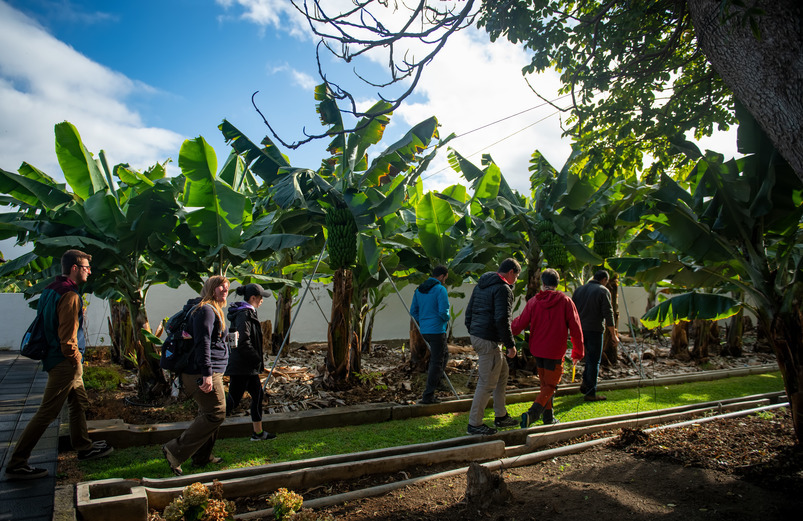While Abroad Resources
Cultural Adjustment
Familiarize yourself with the common stages of cultural adjustment and tips for processing your experience.
Let's GoSelf-Care & Mental Wellness Abroad
Discover tips and resources for self-care and mental health wellness while abroad.
Documenting Your Experience
Learn about photography, blogging and journaling while abroad!
Cultural Adjustment
Studying abroad is both an exciting and challenging time! You will be embarking on an adventure and navigating a new culture, country, and academic system. Understanding the common phases of cultural transitions is important as it will allow you to recognize that what you are feeling is entirely normal and a part of the cultural learning process.

Phases of Cultural Transitions
According to Paige Butler’s Cultural Transitions Model, there are six phases of cultural adjustment. See below for definitions of each phase as well as common responses during each phase.
While these are commonly experienced phases, not all individuals will experience all of them; individual responses to each phase will differ as well. Furthermore, each phase may elicit emotional responses that can be perceived as positive, negative, neutral, or somewhere in between.
For more detail about the Cultural Transitions Model, please reference:
Butler, Paige E. (2019). The cultural transitions model: Moving beyond culture shock to enhance student learning abroad. Journal on Excellence in College Teaching, 30(4), 67-93. https://eric.ed.gov/?id=EJ1247599

An early phase in which you become aware of new, exciting, visible surface-level and
striking differences as you transition to a new culture. While this may be initially
energizing, it can also lead to overstimulation and fatigue.
General Responses: Excitement, newness, superficial judgement, overstimulated, overwhelmed
An early and ongoing transitional phase focused upon seeking out understanding of
a new cultural context. This could include seeking out visible cultural elements (e.g.
visiting landmarks) and works toward deeper examination of a culture (e.g. food, history,
etc.) including more invisible aspects of culture.
General Responses: From superficial to deeper encounters with culture (food, people, history, language,
etc.), a wide range of emotions may occur.
This is a trial and error phase in which you may make conscious decisions that help
you to navigate daily life and build relationships in the host culture.
General Responses: Experience of trial & error, daily living, recalibrating expectations and energy
This phase can occur in response to encountering difficulty in daily living can lead
to frustration or annoyance.
General Responses: Frustration/annoyance, extended overstimulation,withdrawal/stress response behaviors,
and breakthroughs in learning
Cultural fatigue often happens when you have to continuously process the new culture.
Individuals may feel disconnected from home culture and/or their own cultural identity.
General Responses: Perfectionism or defeatist attitudes, decline in engagement, increased irritability,
homesickness, physical fatigue, psychological fatigue that impacts decision-making,
reasoning and language expression.
This phase may manifest in response to observable behaviors in the host culture perceived
as ‘different’ from one’s home culture, particularly those that may irritate or annoy
an individual (e.g. street harassment, staring, etc.).
General Responses: From minor to critical incidents, confronting values, heightened emotional responses,
feeling critical of home or host country, critical of self or others
Common Reactions to Cultural Adjustment
- Exhaustion, fatigue or changes to your appetite.
- Major concern over small health problems.
- Increased use of alcohol or drugs.
- Craving things from home (food, amenities, etc.) and homesickness.
- Strong desire to interact only with students on your program or non-locals.
- Fits of anger and frustration or depression alternating with elation.
- Superior attitude toward host nationals. You find yourself complaining about and criticizing everything.
- Feelings of rejection, isolation, and loneliness.
Tips for Cultural Adjustment
- Take care of yourself physically
- Give yourself permission to feel bad
- Don't make any big life changes while abroad
- Be open-minded and curious
- Use your observation skills
- Recognize that culture is relative
- Find cultural allies and ask questions
- Give yourself (and others) permission to make mistakes
- Be patient – don't expect yourself to understand everything immediately
- Try to establish new friendships
